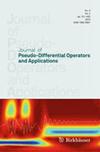A structure theorem for fundamental solutions of analytic multipliers in $${\mathbb {R}}^n$$
IF 1.3
3区 数学
Q2 MATHEMATICS
Journal of Pseudo-Differential Operators and Applications
Pub Date : 2024-02-26
DOI:10.1007/s11868-024-00586-2
引用次数: 0
Abstract
Using a version of Hironaka’s resolution of singularities for real-analytic functions, any elliptic multiplier \(\text {Op}(p)\) of order \(d>0\) , real-analytic near \(p^{-1}(0)\) , has a fundamental solution \(\mu _0\) . We give an integral representation of \(\mu _0\) in terms of the resolutions supplied by Hironaka’s theorem. This \(\mu _0\) is weakly approximated in \(H^t_{\text {loc}}({\mathbb {R}}^n)\) for \(t<d-\frac{n}{2}\) by a sequence from a Paley-Wiener space. In special cases of global symmetry, the obtained integral representation can be made fully explicit, and we use this to compute fundamental solutions for two non-polynomial symbols.
$${mathbb {R}}^n$ 中解析乘数基本解的结构定理
摘要 使用 Hironaka 的实解析函数奇点解析的一个版本,任何阶 \(d>0\) 的椭圆乘法器 \(text {Op}(p)\) ,在 \(p^{-1}(0)\) 附近的实解析,有基本解 \(\mu _0\) 。有一个基本解。我们根据 Hironaka 定理提供的决议给出了 \(\mu _0\) 的积分表示。对于 \(t<d-\frac{n}{2}\) 来说,这个 \(\mu _0\) 在 \(H^t_{\text {loc}}({\mathbb {R}}^n)\) 中被帕利-维纳空间的序列弱逼近。在全局对称的特殊情况下,所得到的积分表示可以是完全显式的,我们用它来计算两个非多项式符号的基本解。
本文章由计算机程序翻译,如有差异,请以英文原文为准。
求助全文
约1分钟内获得全文
求助全文
来源期刊

Journal of Pseudo-Differential Operators and Applications
MATHEMATICS, APPLIED-MATHEMATICS
CiteScore
2.20
自引率
9.10%
发文量
59
期刊介绍:
The Journal of Pseudo-Differential Operators and Applications is a forum for high quality papers in the mathematics, applications and numerical analysis of pseudo-differential operators. Pseudo-differential operators are understood in a very broad sense embracing but not limited to harmonic analysis, functional analysis, operator theory and algebras, partial differential equations, geometry, mathematical physics and novel applications in engineering, geophysics and medical sciences.
 求助内容:
求助内容: 应助结果提醒方式:
应助结果提醒方式:


